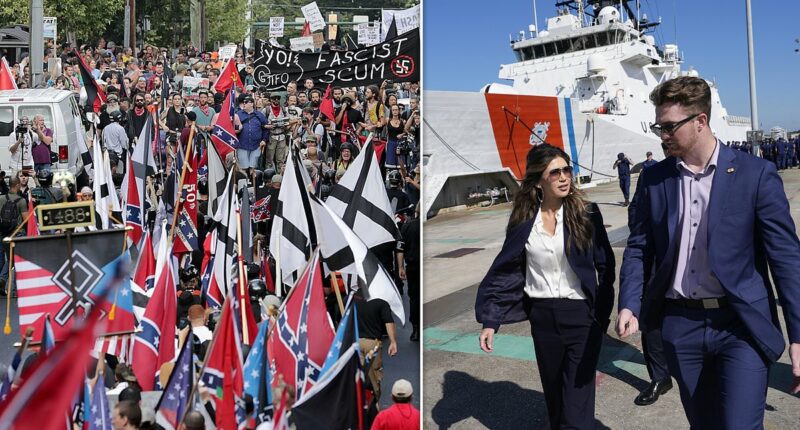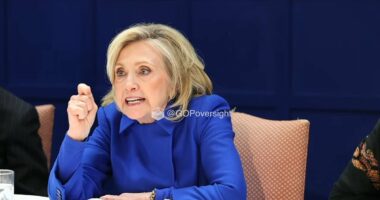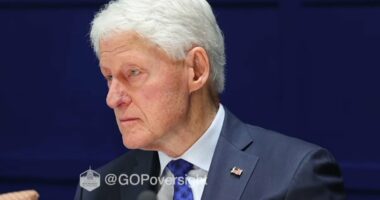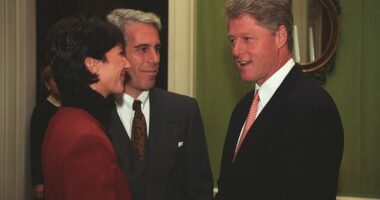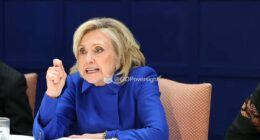Share this @internewscast.com
The Coast Guard is vehemently countering a surprising report suggesting a shift in how swastikas are categorized within the military branch, moving away from labeling them as hate symbols.
According to a Thursday article in The Washington Post, the swastika, a notorious emblem of Nazi ideology and antisemitism, would be regarded as ‘potentially divisive’ under proposed new regulations.
This update would also see the reclassification of nooses and the Confederate flag, although the prohibition on displaying the Confederate flag would still stand, as indicated by the revised guidelines.
Additionally, service members would face a tighter window, limited to 45 days, to report incidents involving the display of nooses or swastikas.
This change has drawn criticism, with opponents expressing concern that it could discourage reporting, particularly since Coast Guard personnel can be stationed away from home for extended periods.
Notably, the prior policy did not impose any time constraints on such reports.
‘If you are at sea, and your shipmate has a swastika in their rack, and you are a black person or Jew, and you are going to be stuck at sea with them for the next 60 days, are you going to feel safe reporting that up your chain of command?’ a Coast Guard official told the Post.
In the Post’s report, the newspaper provided side-by-side language of the 2023 policy versus the one that is set to be implemented on December 15.

The Coast Guard is pushing back on a report that said the military branch is planning to no longer characterize swastikas as hate symbols, despite a new policy that refers to them instead as ‘potentially divisive symbols’

Hundreds of white nationalists, neo-Nazis and members of the ‘alt-right’ are seen marching in Charlottesville, Virginia in August 2017, after the town decided to remove a statue of Confederate General Robert E. Lee
‘The following is a non-exhaustive list of symbols whose display, presentation, creation, or depiction would constitute a potential hate incident: a noose, a swastika, supremacist symbols, Confederate symbols or flags, and anti-Semitic symbols,’ read the policy in 2023.
‘The display of these types of symbols constitutes a potential hate incident because hate-based groups have co-opted or adopted them as symbols of supremacy, racial or religious intolerance, or other bias,’ the policy continued.
The November 2025 policy read: ‘Potentially divisive symbols and flags include, but are not limited to, the following: a noose, a swastika, and any symbols or flags co-opted or adopted by hate-based groups as representations of supremacy, racial or religious intolerance, or other bias.’
On Thursday, the acting Commandant of the Coast Guard, Admiral Kevin Lunday, argued that the fresh wording did not represent a policy change.
‘The claims that the U.S. Coast Guard will no longer classify swastikas, nooses or other extremist imagery as prohibited symbols are categorically false,’ Lunday said in a statement posted on X. ‘These symbols have been and remain prohibited in the Coast Guard per policy.’
Lunday said any display of these symbols would be investigated and violators would be punished.
‘The Coast Guard remains unwavering in its commitment to fostering a safe, respectful and professional workplace,’ he said.
‘Symbols such as swastikas, nooses and other extremist or racist imagery violate our core values and are treated with the seriousness they warrant under current policy,’ Lunday added.

White House press secretary Karoline Leavitti ignored a question about the Coast Guard’s change of policy during Thursday’s press briefing, as the same reporter had asked her why President Donald Trump referred to a journalist as ‘piggy’

The Department of Homeland Security oversees the Coast Guard during peace time, with Homeland Security Secretary Kristi Noem touring U.S. Coast Guard Station Charleston earlier this month
The report on Nazi insignia comes at a time when anti-semitism is roiling the Republican Party, which has split over its longtime allegiance to Israel and its military pursuits.
White House press secretary Karoline Leavitt ignored a question about the Coast Guard story during her Thursday briefing, moving on quickly after the same reporter had asked her about President Donald Trump calling a journalist ‘piggy.’
The policy change attracted fury online.
‘A swastika is a hate symbol, plain and simple. If Kristi Noem thinks that’s up for debate then she has no business overseeing our Coast Guard. We should be doing everything we can to combat rising antisemitism. Why on earth would anyone in DHS make this change?’ commented Democratic Nevada Senator Catherine Cortez Masto.
The Department of Homeland Security oversees the Coast Guard during peacetime, meaning Noem is in charge.
Illinois Governor JB Pritzker, a likely 2028 Democratic White House hopeful, also chimed in.
‘I helped build a Holocaust museum so future generations would understand the horror of the swastika – not watch our own government rebrand it, the noose, and the Confederate flag as merely “potentially divisive,”‘ Pritzker posted to X.
Trump has made several moves to restore Confederate imagery in the United States, after statues were taken down and military bases were renamed in the aftermath of the Black Lives Matter protests during the summer of 2020.
Late last month, a statue of Confederate General Albert Pike was reinstalled in a park near the headquarters of the Labor Department in Washington, D.C.
In recent weeks, the president has also said glowing things about the Confederate General Robert E. Lee.
In October, as the president discussed what’s being called the Arc de Trump – an archway Trump wants to see installed to mark the country’s 250th anniversary next year – he noted how that spot was going to be used for a Lee statue in the early 1900s.
‘Would have been OK with me,’ Trump said. ‘Would have been OK with a lot of people in this room.’
